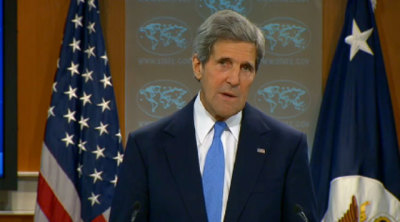Kerry: Blasphemy, Apostasy, Anti-Semitism Troubling Trends in Int'l Religious Freedom Report
U.S. Secretary of State John Kerry on Monday introduced the release of the 2012 International Religious Freedom report, which is compiled by State Department employees annually to reveal the status of the advancement of religious freedom abroad.

"This report shines light on the challenges people face as they seek nothing more than basic religious freedom and the right to worship as they wish," Kerry said. "And its release is a demonstration of the abiding commitment of the American people and the entire U.S. government to the advancement of freedom of religion worldwide."
The report chronicles global violence in democracies and dictatorships, and cites incidents of Holocaust denial and expressions of anti-Semitism by government officials, religious leaders and the media, which has led to desecration and violence, particularly in Venezuela, Egypt and Iran.
Kerry said increasing anti-Semitism was a troubling trend, and announced that Ira Forman, former CEO of the National Democratic Council, will hold the position of special envoy to monitor and combat anti-Semitism.
"Another troubling trend is the increasing use of laws governing blasphemy and apostasy," Kerry said. "These laws are frequently used to repress dissent, to harass political opponents and to settle personal vendettas. Laws such as these violate fundamental freedoms of expression and religion, and we believe they ought to be repealed."
Kerry also mentioned that he was among the members of Congress who in 1998 passed the International Religious Freedom Act, the law that mandates the preparation of the State Department report.
"When countries undermine or attack religious freedom, they threaten their country's own stability. Attacks on religion are both a moral and strategic national concern for the United States," Kerry said.
Providing details about the IRF report, Susan Johnson Cook, ambassador-at-large for the Office of International Religious Freedom, highlighted specific international concerns, including the targeting of faith groups and religious minorities in Syria, Iraq and Burma, among others, and sectarian violence in Pakistan and increasing anti-Semitism in Europe.
Cook, who recently visited Vietnam, China and Saudi Arabia to discuss issues pertaining to religious freedom with senior government officials, commended the Vietnam government for "taking a step forward by allowing large-scale worship services with more than 100,000 participants."
The Rob Schenck, president of the Washington, D.C.-based National Clergy Council and chairman of the Evangelical Church Alliance International, told CP on Monday that Cook's personal investment and devotion to the cause of global religious freedom has brought added enthusiasm and confidence in the work that's being done in her office.
According Schenck, Cook is a "bridge builder," who has been able to transcend politics and communicate with leaders of both parties and an array of religious leaders to bring added attention to persecuted groups around the world.
"She's a woman of deep faith and she takes these cases personally," he said. "She's very hopeful, even though she has seen the very worst." Schenck also cautioned that even though it appears progress is being made in Vietnam and in China – where the government first refused Cook before finally inviting her to the country to meet with officials and leaders of an illegal house church – "we have a long way to go, and no one should understate that."
In her outline of the IRF report, Cook also mentioned concerns for persecuted religious leaders including Saeed Abedini, the American pastor who holds dual citizenship in the U.S. and Iran, and was sentenced to eight years in prison in his native country, because he's a Christian.
The State Department's annual report precedes an expected update from the department on the list of "countries of particular concern" – the category for the worst religious freedom violators. The secretary of state designated eight countries in August 2011 as CPCs, each of which remains on the list in the 2012 report and includes Burma, China, Eritrea, Iran, North Korea, Saudi Arabia, Sudan and Uzbekistan.





















